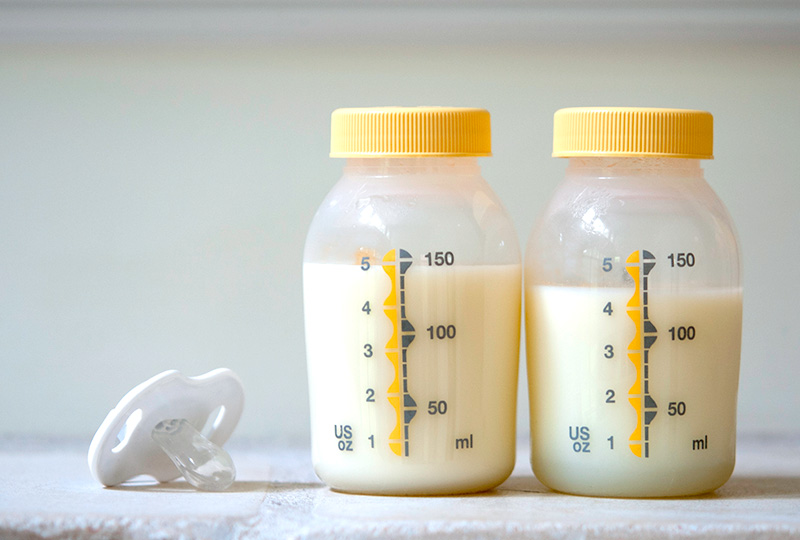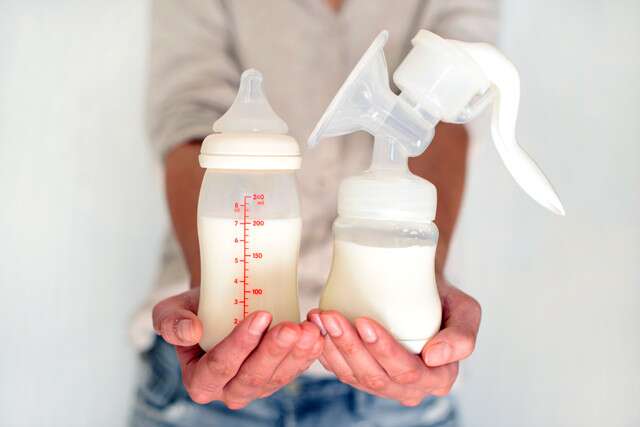Infant nutrition experts often laud breast milk as liquid gold. Its nutritious qualities provide nourishment and protection to infants. But when a mother’s milk is unavailable, someone else’s breast milk could be an adequate replacement.
The “Pros and Cons of Using Someone Else’s Breast Milk” is a topic that features a lot of different opinions.
For some mothers, using another mother’s breast milk can be a lifesaver when their own supply is insufficient or unavailable. For others, it raises concerns, from safety issues to psychological ramifications.
We aim to arm you with evidence-based information in this comprehensive examination of breast milk donation practices. To provide balanced answers, we will explore its various aspects – science, societal perspectives, benefits, and risks.
Advantages of Donor Breast Milk
Nutritional Superiority of Breast Milk
Breast milk is an incredible, complex liquid filled with essential nutrients for infant growth and development. It provides the ideal combination of proteins, fats, vitamins, and carbohydrates explicitly tailored for an infant’s digestive system. According to a 2019 study published in “Nutrients” human milk provides optimal nutrition to encourage neurological and immunological growth in infants.
Donated breast milk is often the next best solution when maternal milk is unavailable.
Donated Breast Milk and Preterm Infants
Preterm infants, in particular, can benefit significantly from donated breast milk. Their immature immune and digestive systems make them especially prone to infections and digestive issues that arise as a result.
Studies conducted and published in 2018 by “The Journal of Pediatrics” demonstrated that preterm infants fed donor breast milk experienced significantly fewer cases of necrotizing enterocolitis – an intestinal condition. Another research paper from “The Lancet” indicated feeding preterm babies human milk led to better cognitive outcomes later on. These findings support using donated breast milk instead of formula when the mother’s milk is either inadequate or unavailable.

Immunological Benefits of Donor Breast Milk
Breast milk provides more than nutrition – it also serves as the infant’s first line of defense against illness. Breast milk contains various immune-protecting factors like antibodies, white blood cells, and probiotics, providing optimal protection.
Studies published by the “Journal of Allergy and Clinical Immunology” demonstrated a reduced rate of respiratory and gastrointestinal infections in babies fed breast milk versus formula feed, further emphasizing its superiority over artificial substitutes like formula feed.
Psychological and Emotional Benefits
While physical health is, of course, of paramount importance, using donated breast milk also has psychological ramifications. Mothers unable to produce sufficient milk may find using donated milk a soothing relief from the guilt and stress associated with the inability to breastfeed their infants.
The World Health Organization and the American Academy of Pediatrics both endorse donor milk as an option for mothers when their own milk cannot be provided for their infant. These endorsements comfort mothers who rely on donor milk as an essential infant nutrition form.
Donor breast milk provides many advantages for infants and mothers who cannot breastfeed, including optimal nutrition and infection protection. Donated milk is an invaluable resource for mothers unable to breastfeed themselves.
Want to learn more about breast milk and formula? Watch this short video comparing breast milk to formula.
Donated Breast Milk vs Formula
Nutritional Content
Donated Breast Milk
Breast milk is widely considered the “gold standard” of infant nutrition. Breast milk is full of bioactive components such as antibodies, enzymes, and hormones, increasing its nutritional superiority compared to any alternative.
Studies published in the “American Journal of Clinical Nutrition” revealed that breast milk contains long-chain polyunsaturated, which play an essential role in brain development and visual acuity. While formula can also have them, they are less readily absorbed.

Baby Formula
Formula was designed to replicate the nutritional composition of breast milk and is an adequate nutritional replacement when breast milk is unavailable. However, its nutrients are less readily absorbed into infant bodies. In addition, breast milk contains unique immune-enhancing and bioactive components which cannot be found elsewhere.
Digestibility
Breast milk’s unique composition makes it easier for newborns to digest than formula; its proteins break down more readily, making breast milk an ideal food choice for infants who may otherwise struggle with digesting solid food, leading to reduced digestive issues such as constipation or diarrhea in those fed this source of nourishment.
Formula can be more challenging for babies to digest, potentially leading to digestive discomfort and issues. Some infants may even develop intolerances or allergies to specific components found in formula, such as cow’s milk protein.
Potential Risks of Heavy Metals
The safety of donated breast milk and formula is a primary concern for parents when deciding which is best for their baby. While breast milk banks screen and pasteurize donated milk to ensure its safety, not all donations receive such thorough scrutiny.
And while formula is manufactured under stringent safety standards, some studies have raised concerns over potentially harmful ingredients found in certain formulas. One such research article published by JAMA Pediatrics revealed heavy metal traces such as lead and arsenic in certain brands.
Long-Term Health Impact
Breast milk and formula help infants grow healthy, yet research points to the potential long-term advantages associated with breastfeeding, such as decreased risks of obesity, diabetes, and certain infections due to its impact on developing a balanced gut microbiota.
Though formula may provide adequate nutrition, breast milk offers more significant long-term health advantages.
Disadvantages of Donor Breast Milk
Safety Concerns
Risk of Disease Transmission
One of the primary concerns with donor breast milk is disease transmission. While most banks implement rigorous screening and pasteurization processes to ensure safe milk, not all donated milk undergoes such processes – according to one study published in “Journal of American Medical Association”, unscreened donor milk could contain harmful bacteria or viruses that pose health threats.
Pasteurization and Nutrient Loss
Pasteurization of donor breast milk is essential to its safety, yet may lead to some of its beneficial components being reduced slightly, according to research published in “Journal of Perinatology”. Pasteurization can reduce certain immune-protective elements and bioactive compounds present in breast milk.

Nutritional Variability
Breast milk composition varies with each baby depending on age, time of day, or even at a single feeding. Donated breast milk may not perfectly meet the nutritional requirements of all infants who drink it from different mothers (particularly if coming from older infants). While still nutritionally superior to formula, this factor should be kept in mind.
Accessibility and Cost
Accessing safe, screened, and pasteurized donor breast milk can be challenging. Not all areas offer breast milk banks, while online milk-sharing platforms may not always deliver milk that has been appropriately screened and pasteurized.
Cost can also be an impediment. While some insurance policies cover donor milk for medically necessary situations such as preterm infants, coverage may not always apply.
Psychological Factors
Mothers using donor breast milk may face complex emotional hurdles, such as guilt, inadequacy, or discomfort. It’s important to recognize these feelings as valid. However, remember, you are not alone in using donor milk. Many mothers are in the same situation.
Final Thought
Donor breast milk offers many advantages that resemble those offered by a mother’s own milk in terms of nutrition quality and bioactive components. Yet, potential drawbacks such as safety concerns, nutritional variability, accessibility challenges, and emotional complexities should not be neglected when making such an important choice.
Every family must make this decision in light of their unique situation while keeping the needs and well-being of their child as a top priority. Communicate openly with healthcare professionals so you thoroughly understand all available options. Ultimately, the goal is to provide optimal nourishment and care to infants, whether from the mother’s own milk, donor breast milk, or formula.
Selecting an infant’s source of nutrition is an integral component of their growth and development, and families should take great care and consideration in making informed choices for their little one’s future well-being.

